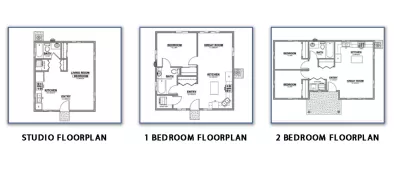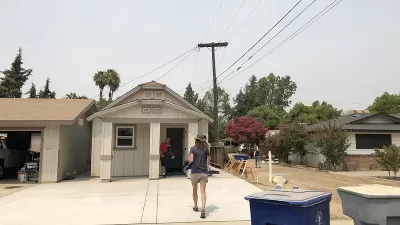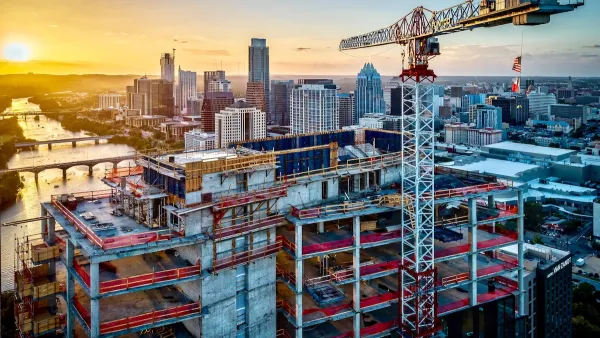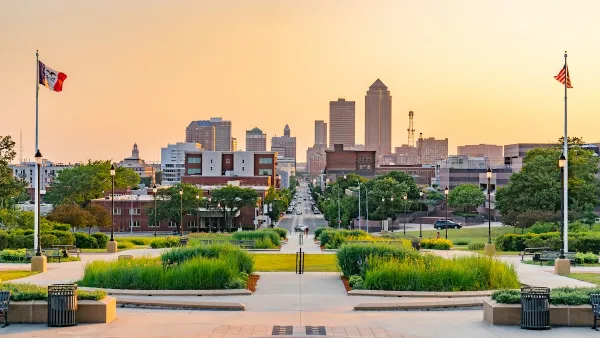Why doesn’t Denver build more ADUs? It’s complicated.

Joe Rubino poses the question of why Denver is building and permitting more accessory dwelling units (ADUs) despite their multiple benefits.
“They can serve as a source of income for homeowners struggling to keep up with Denver’s rising cost of living and property taxes. Or they can house aging relatives, providing parents and grandparents with the opportunity to live just a few steps from loved ones but also maintain some privacy,” writes Rubino. “They have environmental benefits, providing options for the reuse of garages or underutilized space within a home. They create infill housing close to transportation corridors and employment centers instead of driving more sprawl on the periphery of town.”
Despite those reasons and the rising cost of rents in Denver, the city permitted only 393 ADUs between 2010 and 2021—2010 being the year the city passed its “big zoning overhaul.”
“That’s roughly 33 permits per year over that span. The high-water mark was 2019 when 71 permits were pulled. In 2021, the city issued 64,” writes Rubino.
Renee Martinez-Stone, a former Denver Planning Board member and Denver Housing Authority staffer, is quoted in the article saying that everyone understands the need for more ADUs, but that doesn’t seem to be enough to build them. Martinez-Stone is leading a program at the Denver Housing Authority to make it easier to permit and build ADUs in west Denver neighborhoods, according to Rubini. The city’s department of Community Planning and Development also has an ADU program, but the regulatory market for ADUs remains complex, according to Martinzez-Stone.
“So far, city planners and the advisory committee have focused on identifying barriers to development, Barge said. Those barriers include that some residential lots, those under 3,000 square feet, aren’t eligible for ADUs because they are deemed too small. The city’s zoning code also caps an ADU’s height at either 24 feet or 1.5 stories. The 1.5-story measure is a technical way of divvying up a two-story building that can drive up construction costs and prevent a homeowner from following through on building,” writes Rubino.
More details on ADUs and the Denver development market are included in the source article.
FULL STORY: Everyone agrees accessory dwelling units can help Denver’s housing crunch. So why are so few being built?

Planetizen Federal Action Tracker
A weekly monitor of how Trump’s orders and actions are impacting planners and planning in America.

Maui's Vacation Rental Debate Turns Ugly
Verbal attacks, misinformation campaigns and fistfights plague a high-stakes debate to convert thousands of vacation rentals into long-term housing.

San Francisco Suspends Traffic Calming Amidst Record Deaths
Citing “a challenging fiscal landscape,” the city will cease the program on the heels of 42 traffic deaths, including 24 pedestrians.

Amtrak Rolls Out New Orleans to Alabama “Mardi Gras” Train
The new service will operate morning and evening departures between Mobile and New Orleans.

The Subversive Car-Free Guide to Trump's Great American Road Trip
Car-free ways to access Chicagoland’s best tourist attractions.

San Antonio and Austin are Fusing Into one Massive Megaregion
The region spanning the two central Texas cities is growing fast, posing challenges for local infrastructure and water supplies.
Urban Design for Planners 1: Software Tools
This six-course series explores essential urban design concepts using open source software and equips planners with the tools they need to participate fully in the urban design process.
Planning for Universal Design
Learn the tools for implementing Universal Design in planning regulations.
Heyer Gruel & Associates PA
JM Goldson LLC
Custer County Colorado
City of Camden Redevelopment Agency
City of Astoria
Transportation Research & Education Center (TREC) at Portland State University
Jefferson Parish Government
Camden Redevelopment Agency
City of Claremont





























